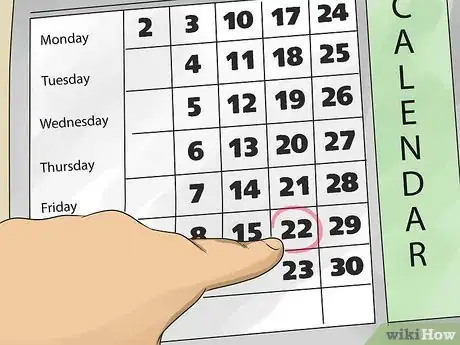This article was co-authored by Tracey Rogers, MA. Tracey L. Rogers is a Certified Life Coach and Professional Astrologer based in Philadelphia. Tracey has over 10 years of life coaching and astrology experience. Her work has been featured on nationally syndicated radio, as well as online platforms such as Oprah.com. She is certified as a Coach by the Life Purpose Institute, and she has an MA in International Education from George Washington University.
There are 13 references cited in this article, which can be found at the bottom of the page.
wikiHow marks an article as reader-approved once it receives enough positive feedback. In this case, 100% of readers who voted found the article helpful, earning it our reader-approved status.
This article has been viewed 104,249 times.
If you have a tendency to overthink every decision you’re faced with or always put off making decisions for as long as possible, you’re definitely not alone! Being decisive can be scary, but it also makes life so much easier and helps you accomplish more of your goals. The good news is that anyone can learn to be more decisive, and it doesn’t have to be hard. Below we’ve put together some tips to help you get started.
Steps
Training Your Brain
-
1Decide to be decisive. This might seem like circular reasoning, but the fact remains that you must first make the decision to become a more decisive person before you can actually be decisive. If you're naturally indecisive, you will continue to be that way by habit. Becoming decisive will require active, conscious effort.[1]
- Tell yourself that you are decisive—not that you "can be" or "will become" decisive, but that you already "are." On the flip side, you also need to stop telling yourself that you are indecisive, and you need to stop telling that to other people, too.[2]
-
2Picture yourself as a decisive person. Try to imagine it. Ask yourself how it will feel to be more decisive and what you will look like to others once you start taking a more decisive stance on matters. The more you visualize it, the clearer and more familiar the image will become.
- Pay special attention to feelings of self-confidence and signs of respect from other people. If you're naturally pessimistic, it might be difficult to imagine positive results.[3] Force yourself if you have to, though, and don't fixate on worries about things getting messed up or people getting angry at you.
Advertisement -
3Stop worrying about "bad" decisions. Acknowledge that each decision you make will lead to a learning opportunity, even those decisions that cause seemingly unfavorable outcomes. By learning to see the good in each decision you make, you can become less fearful of those that turn out poorly.[4]
-
4Be brave in the face of your mistakes. Everyone makes mistakes. Saying so might seem trite, but it's the truth. Acknowledging and accepting this truth will not make you weaker, though. On the contrary, by embracing your imperfection, you can train your mind to stop fearing it. Once you overcome that fear, it will no longer be able to control you and hold you back.[5]
-
5Realize that indecisiveness is also a decision. Something will happen whether you actively choose it or not. In that sense, not making a decision is the same thing as making a decision. By not making the decision yourself, though, you lose control of a situation. Since something always results from each decision making opportunity, you're ultimately better off making the decision and keeping the control than letting it slip out of your hands.[6]
- For example, you might be torn between two job opportunities. If you refuse to make a decision about which to choose, one company might withdraw their offer, causing you to choose the other company. The first job might have actually been the better one, but you missed out on it because you did not go through the work of making the choice.
Practicing Decisiveness
-
1Throw yourself an easy choice for practice. As the saying goes, “practice makes perfect.” Start giving yourself simple decisions to make that have minimal consequences. Continue practicing with these small decisions until you can make them in under a minute.[7]
- Small decisions include questions like, "What should I have for dinner?" or "Would I rather see a movie or stay at home this weekend?" Generally, these choices do not have long-term consequences and will only affect you or a small group of people.
-
2Create a more advanced situation. Once you get comfortable with your small choices, put yourself into situations that will require you to make much more daring decisions in a similarly short period of time. The consequences do not need to be anything too grave, but the choices themselves should be more intimidating.
- For example, you could buy two tickets to an event before you secure a date or buy the ingredients before you pick a recipe to make. If you're worried about something going to waste, you're more likely to be assertive about making a choice to avoid that waste.
-
3Force yourself to make a decision. When you are inevitably forced to make a decision at the drop of a hat, do so. Trust your gut and learn to listen to your instincts. You might stumble a few times, but with each experience, you'll gradually sharpen and improve your intuition.
- This is actually a pretty big part of the process. You need to have faith in the idea that you're already capable of making good, split-second decisions. If your initial results suggest otherwise, simply keep at it until you do get good at it and trust that that day will come after enough experience.
Making Better Decisions
-
1Set deadlines. When you are faced with a choice that does not require an instant answer, give yourself a deadline for your decision. If an external deadline already exists, create a separate internal deadline for you to abide by that comes well before the external deadline arrives.
- Most decisions do not require as much time to make as you might initially assume. Without a deadline, you are more likely to procrastinate on making a decision, which can ultimately lead to a greater sense of uncertainty when you do make a choice.
-
2Get as much information as possible. Gather as much information as possible about each possible choice involved in the matter. When you know that you are well informed, you will naturally feel more capable of reaching a decent conclusion.[8]
- You need to actively seek out the information you're looking for. Do not sit around and wait for it to drop in front of you. Research the issue at hand from as many different angles as possible in the time that you have.
- Sometimes, you may reach your decision in the midst of your research. If this happens, trust your gut and go with it. If it doesn't, though, review your research after you've gathered as much as you can and navigate through the decision from there.
-
3List the pros and cons. The practice is an old one, but a good one. Write out the advantages and disadvantages involved with each possibility. Giving yourself a visual representation of your possible consequences can allow you to look at your options more objectively.[9]
- Also keep in mind that not all “pros” and “cons” are equal. Your “pro” column may only have one or two points in it while the “con” column has four or five points, but if the two points in the “pro” column are really important and the four in the “con” column are fairly insignificant, the “pros” can still outweigh the “cons.”
-
4Step back from your initial perceptions. If no option seems like a good one, ask yourself if you are really looking at all possible choices in the matter. If there are perceptions or ideas holding you back from considering other alternatives, knock those down and look at outside options without bias.[10]
- Some of the limits you naturally set are good, of course. Knocking those limits down long enough to consider the options that lie beyond them won't hurt because you'll still be able to realize that those options are not good. Giving yourself more options does not mean that you'll be blind to bad choices; it only means that you'll have a chance to find a good choice that you never would have considered before.
-
5Imagine the outcome. Picture how things will be if you make a specific decision. Imagine both the positives and the negatives. Do this with each option, then ask yourself which imagined future is ultimately the best one.
- Consider your feelings, as well. Imagine how you will feel upon choosing one option over another, and ask yourself if one choice will leave you feeling fulfilled while another may leave you feeling empty.
-
6Pick out your priorities. Sometimes there is no way to avoid a bit of unpleasantness. When this happens, ask yourself which priorities are the most important. Fixate on satisfying those priorities over the matters you consider less pressing.
- Sometimes, this means defining core values. For instance, when making a choice regarding the future of your relationship, ask yourself what you really find important in a relationship. If sincerity and compassion are more important to you than excitement, you'd be better off with the sincere homebody than the adventurous liar.
- Other times, this means determining which consequences are of greater value than others. If you need to make a decision on a project and realize that you cannot satisfy both your budget and your quality demands, ask yourself if the budget or the quality is of greater significance for that project.
-
7Reflect on the past. Review your memory and think about any decision you faced in the past that may have been similar to the decision currently in front of you. Think about the choices you made then and ask yourself how they turned out. Mimic the good choices and act oppositely of the bad choices.
- If you have a habit of making bad choices, ask yourself what the underlying cause of those bad choices might be. For instance, maybe most of your poor decisions are based on a lust for wealth or power. If that's the case, then factor out those options that would satisfy that craving and consider other alternatives.
-
8Stay in the present. While you can reflect on the past to help guide you in the present, ultimately, you need remember that you are currently in the present. Anxieties and fears about things that happened in the past should be left in the past.[11]
Managing the After Effects
-
1Keep a journal and look back on it. Write down a record of the major choices you make and the reasoning that went into each choice. When you start to doubt or waver about one of those decisions, read what you wrote about it. Reading the thought process behind your decision can often help strengthen your resolve.[12]
- You can also look at this journal during “off” times, when you do not need to make any decision or when the consequences of a past decision no longer weigh on your mind. Read through your entries to see your thought process and examine it objectively. Assess your past choices, asking yourself what leads to success and what leads to failure, and take notes for the future.
-
2Avoid living in the past. When a decision turns out poorly, analyze what went wrong, then press forward and move onto the next choice. Regret will not do you any favors. It can't turn back time, but it can hold you back and typically does.[13]
Community Q&A
-
QuestionWhat if I can't tell anyone my decision and there's no one who can help me, even on the web?
 Community AnswerNot everything can be found on the web, and there are other ways of expressing yourself. Maybe write a story or a poem. Keep a diary or paint your emotions. Make a sculpture out of clay. Also, think through your decision, go through all the options and explore all the details.
Community AnswerNot everything can be found on the web, and there are other ways of expressing yourself. Maybe write a story or a poem. Keep a diary or paint your emotions. Make a sculpture out of clay. Also, think through your decision, go through all the options and explore all the details.
References
- ↑ https://www.psychologytoday.com/us/blog/laugh-cry-live/201706/how-mindfully-make-important-life-decisions
- ↑ http://thinksimplenow.com/clarity/9-steps-to-be-decisive/
- ↑ https://www.psychologytoday.com/us/blog/click-here-happiness/201803/think-positive-11-ways-boost-positive-thinking
- ↑ https://hbr.org/2013/11/stop-worrying-about-making-the-right-decision
- ↑ https://www.forbes.com/sites/amymorin/2017/07/17/5-ways-to-turn-your-mistake-into-a-valuable-life-lesson/
- ↑ https://www.psychologytoday.com/us/blog/your-emotional-meter/201711/7-tips-how-kick-the-habit-indecisiveness
- ↑ https://www.psychologytoday.com/us/blog/schlepping-through-heartbreak/201704/decisiveness-the-fresh-new-key-success
- ↑ https://www.artofmanliness.com/articles/being-decisive/
- ↑ https://www.forbes.com/sites/work-in-progress/2014/06/28/six-ways-to-stop-overanalyzing-become-more-decisive/
- ↑ https://www.entrepreneur.com/article/288701
- ↑ https://www.lifehack.org/articles/lifestyle/mindful-mind-full-techniques-for-staying-the-present-moment.html
- ↑ https://lifehacker.com/why-you-should-keep-a-journal-and-how-to-start-yours-1547057185
- ↑ https://www.success.com/11-genius-tips-to-be-more-decisive/
















































































